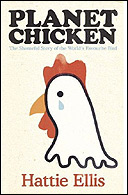
Planet Chicken: The Shameful Story of the Bird on Your Plate
by Hattie Ellis
Sceptre £14.99, pp320
Hattie Ellis was moved to write this diatribe about our cheapest form of protein by the delicious smell of roast chicken emanating from the cafe in her local supermarket, which almost made her gag when she saw the aisle 13 freezer unit with its bits of chicken packaged like bricks and the sign saying 'CAGE'.
First the chicken, then the egg. By next year, Burger King, the second-largest fast-food chain, will source 5 per cent of its eggs from 'cage-free' hens - that amounts to 18,000,000kg of eggs in North America. This, however, is a mere bantam step across the road to chickens' lib because the inverted commas enclose some weasel words. As Ellis's (slightly padded) polemic shows, releasing chickens from the battery cages that hold thousand of laying hens, sometimes at densities of 19 birds per square metre, does not guarantee that they live a good, healthy, open-air life.
There are degrees of concentration camps for chickens. Though 60 per cent of the eggs we buy in the UK still come from Bergen-Belsen-like batteries, there are 'enriched' cages that give birds more space; 'barn-reared', which means they can perch and scratch around but can't leave the building; and 'free range' systems, which means there have to be exits, though the birds don't always use them, either because they're blocked by bullying alpha chickens or simply because the numbers in the shed are still so large that normal chicken behaviour is inhibited.
Normal chicken behaviour includes pecking and scratching for insects and for the tiny pebbles and particles the birds need to collect in their gizzards to mill their food, essential when you don't have teeth (hence 'scarce as hens' teeth'); taking dust baths to rid the feathers and skin of mites; and perching.
At the moment, only Soil Association-certified organic eggs have standards high enough to guarantee that laying hens have an existence anything like this and, anyway, organic eggs make up only 3 per cent of the market. By 2012, Europe will have banned cages, but most producers will simply switch to one of the aforementioned reprehensible systems (I'll leave to your imagination the accompanying stench of excrement, the practice of de-beaking, the problems of disease, weakened muscles and bones). And this deals only with the 30 million laying hens in Britain; it does not affect the 860 million broilers raised here every year for their meat.
The numbers for America are proportionally scarier. So why have chefs in Chicago and Los Angeles become hysterical about the minuscule moral problem of foie gras and supported banning it from their cities' menus (California's ban starts in 2012)? All animal-rights types, like most people concerned about animal welfare, foam at the mouth about foie gras. Why don't they reserve their rabidity for chicken and egg producers and gently salivate when they think about foie gras, which is still, for the most part, produced on virtuous, small-scale farms using perfectly humane methods?
All sorts of foie gras atrocity stories are circulated by so-called animal-lovers, mostly in crude pamphlets with antique photographs, about geese and ducks with their feet nailed to the floor, or being 'force-fed' extra rations of grain to give them their greatly prized swollen livers.
I have seen the gavage, the 'stuffing', done in France. What happens is that the birds form a (disorderly) queue to swallow the flexible tube from the food mill funnel that dispenses the coarsely ground grain that eventually does put the pounds on their livers. There is neither coercion nor pain in this process, only a Konrad Lorenzian conditioning that makes the birds waddle up to the funnel with every appearance of enthusiasm. Granted, the result is that they suffer the mild discomfort of having an enlarged liver, but then, so do many of us. In their case, it's only for a few weeks and it doesn't seem to inhibit their greed.
If the animal-rights activists can't be bothered with so unglamorous a cause as the billions of birds whose welfare is sacrificed to put cheap chicken on our plates (could there be an element of class warfare in their foie gras fomentations?), perhaps they ought to turn their attentions to another minority food treat that poses genuine ethical issues and look at the production of kobe beef.
Now that's nasty. Cattle are often shipped from America, where they are fattened, to be finished and slaughtered in Japan. These last stages include feeding the animals beer - and massaging them. The massages aren't to distribute the fat more evenly, but to make up for the exercise the cattle don't get; confined in their final weeks, their muscles and bones become so weak that some animals are unable even to walk to their own slaughter. We haven't heard a word about this, though, not even from the most militant animal-rights protesters/armed-wing of the vegetarian movement.

